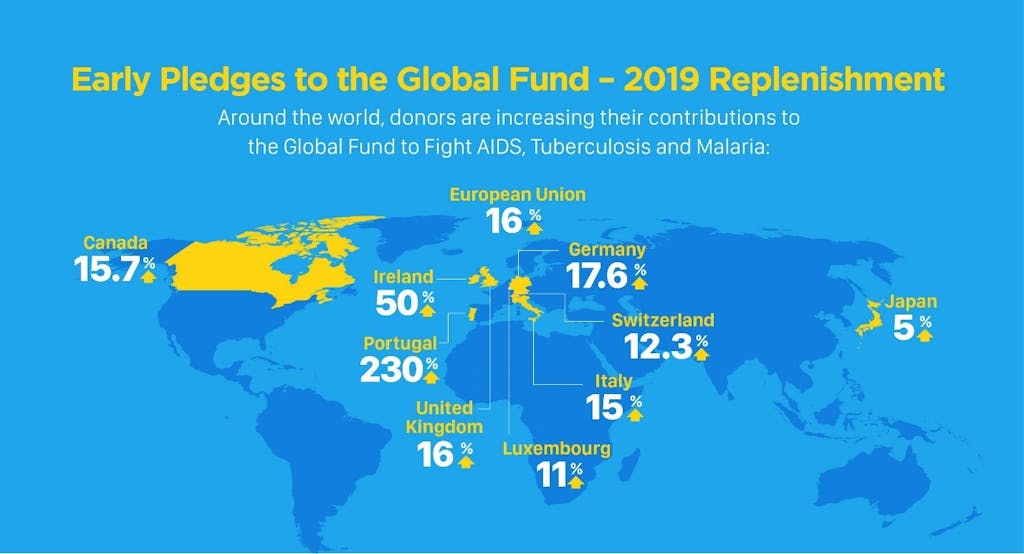The Global Fund to Fight AIDS, Tuberculosis, and Malaria challenged the world with an ambitious ask this year: Step up the fight against the world’s top three deadliest diseases by collectively committing to provide at least $14 billion needed to get back on track to achieve the targets for HIV/AIDS, tuberculosis (TB) and malaria under Sustainable Development Goal 3: Health and well-being for all by 2030.
And governments and private sector companies are answering the call. Throughout major moments in 2019—including the G20 and G7 summits, global development conferences, and even music festivals—world leaders have reaffirmed their commitment to creating a future where HIV/AIDS, TB, and malaria no longer threaten families across the globe.
Where We Stand
Across the board, government and private sector pledges to the Sixth Replenishment of the Global Fund have seen historic increases. New donor countries and companies have also emerged. To date, many governments and private companies have generously pledged increased funding to strengthen the ability of the Global Fund to save lives and strengthen health systems around the world.
The bottom line is? It will take all of us working together across sectors to rise to the massive challenge of creating the health systems and innovations needed to end these three diseases.
 Image Credit: Friends of the Global Fight Against AIDS, Tuberculosis, and Malaria
Image Credit: Friends of the Global Fight Against AIDS, Tuberculosis, and Malaria
What Is Still Needed
France will host the Global Fund’s Sixth Replenishment pledging conference on October 10th in Lyon. As the world looks ahead to this global meeting next month, there are still critical gaps remaining to deliver the a $14 billion needed for the next three years to adequately prevent, test, and treat HIV/AIDS, TB, and malaria around the world. Two major anticipated pledges from a couple of the largest historical donors to the Global Fund—the French and United States governments—have yet to be announced. While pledges made to date have been encouraging, we will need robust pledges from France and the U.S. to be able to get people the lifesaving services they need to combat these epidemics.
What It Will Get Us
Unquestionably, $14 billion is a lot of money. But the Global Fund has a long legacy of showing return on investment. If attained, these funds will help save an estimated 16 million lives, cut the mortality rate from HIV/AIDS, TB and malaria in half—leading to a potential $40 billion in economic growth from malaria elimination alone—and build stronger health systems by 2023. While the Global Fund originally began as an investment to save lives, its reach extends beyond ending epidemics to creating resilient and sustainable health systems, a critical part of achieving SDG 3 while also advancing human rights.
Whether through supply chain and data system improvements or training health care workers, the Global Fund supports people-centered efforts that build stronger, more resilient community responses to disease. The same efforts that support case management and prevention for HIV/AIDS, TB and malaria have also supported expansion of access to primary health care for everyone, particularly the most vulnerable.
Below are just a few ways Global Fund dollars will help create impact:
• Improve health systems: Providing more resources and support to combat HIV/AIDS, TB, and malaria, including medicine, staffing and training.
• Eliminate barriers to health care: Investing in human rights and gender-responsive programs.
• Promote integrated healthcare: Integrating disease control programs in all levels of health system from governance to service delivery.
• Develop and implement digital health technologies: Enhancing health information systems by making data collection processes more efficient and accurate.
• Foster health equity: HIV/AIDS, TB, and malaria disproportionately impact the poorest and most disenfranchised groups of people. Investments will be made in programs actively working to reach these communities.
• Leverage domestic resources: By enforcing co-financing requirements for countries to receive their full allocation of funds, the Global Fund is encouraging crucial domestic investment in health care.
What You Can Do
Everyone must do their part in order to ensure we answer the call to step up the fight and fully fund the Global Fund this October. We need people like you to talk to your leaders and advocate for robust U.S. support for the Global Fund.
You can be a part of the generation that makes HIV/AIDS, TB, and malaria a thing of the past.



 View All Blog Posts
View All Blog Posts


